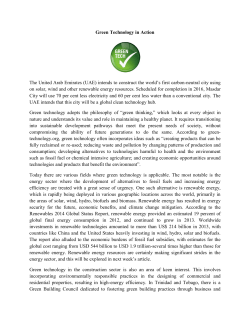
Watts and Volts - Intermountain Rural Electric Association
Watts and Volts February 2015 IREA Annual Meeting of Members to be held Saturday, April 11, 2015 The annual meeting of the members of the Intermountain Rural Electric Association will be held at Woodland Park High School, 151 Panther Way, Woodland Park, Colorado, at 10:00 a.m. on April 11, 2015, to transact the following business: 1.The presentation of reports covering the previous fiscal year; 2.The election of directors; and 3.All other business that may properly come before the meeting. Note: Registration is from 9:00 a.m. to 10:00 a.m. on the day of the meeting. (Cut on line below and return form to IREA) PROXY FOR ANNUAL MEETING OF THE MEMBERS OF THE INTERMOUNTAIN RURAL ELECTRIC ASSOCIATION 5496 North U.S. Highway 85, Sedalia, Colorado 80135 The undersigned hereby appoints _______________________ (name of IREA member/consumer) his or her true and lawful proxy for the annual meeting of the members of the Intermountain Rural Electric Association to be held April 11, 2015, at 10:00 a.m. IN WITNESS WHEREOF, I have hereunto set my hand this _________ day of ______________________, 2015. _________________________________________ ___________________________________________ Customer Account Number Member’s Signature To be deemed valid, proxies must be executed within sixty (60) days of the annual meeting (no earlier than February 10, 2015). Proxies are not permitted for voting in a director election. Bylaws Art. II, Sec. 6 Intermountain Rural Electric Association 5496 N. U.S. Highway 85 Sedalia, CO 80135 303-688-3100 www.irea.coop F: IntermountainREA • T: @IREAcolorado Western Area Power Administration Continues to Provide Low-Cost, Zero-Emitting Power Perhaps in conversations you’ve had regarding energy issues, or maybe while reading a previous issue of Watts & Volts, you’ve heard or read the term “WAPA” used and wondered what it was. WAPA stands for the Western Area Power Administration. This is a government agency within the U.S. Department of Energy whose role is to market and transmit wholesale electricity from multi-use water projects. WAPA has a service area that encompasses a 1.3 million square miles across a 15-state region of the central and western United States, carrying electricity from 56 hydropower plants. Together, their plants have an installed capacity of over 10,000 megawatts. They sell their power to preference customers such as federal and state agencies, cities and towns, public utilities, and rural electric cooperatives like Intermountain Rural Electric Association. Most Federal hydroelectric power plants in the West were constructed in the early to mid-20th century by the Bureau of Reclamation or the U.S. Army Corps of Engineers as features of multi-purpose water development projects. The primary purpose of these large dams was to store water for irrigation and to provide for navigation and flood control. Project-specific authorizations for the use of water, such as meeting municipal and industrial water needs, recreation, salinity control, and fish and wildlife, also existed. Power plants were constructed at the dams to first serve project use loads, such as irrigation water pumping, and then to provide revenue from power sales to help repay project costs. WAPA was established by Congress on December 21, 1977 under Section 302 of the Department of Energy Organization Act. Under this statute, WAPA assumed power marketing responsibilities and ownership, operation and maintenance of the transmission system from the Bureau of Reclamation. The mission of the Western Area Power Authority is to market and deliver clean, renewable, reliable, cost-based federal hydroelectric power and related services. The majority of WAPA’s sales are electricity generated from federal dams across the western United States. WAPA’s power first goes to specific federal projects required by law. Its surplus generation is sold at cost-based rates to preference power customers like IREA under long-term contracts. WAPA’s power is in demand, as it is clean, inexpensive, and reliable. IREA’s growth has exceeded the availability of WAPA power, so we have become increasingly reliant on other sources; today less than 6% of IREA’s electricity comes from WAPA hydropower. We are glad to have that allocation, however, and wish to acknowledge WAPA’s contribution to the Association and to the West. To learn more about the Western Area Power Administration, please visit their website at www.wapa.gov. Applications Open for IREA Education Grants Last month, Intermountain Rural Electric Association began accepting applications for our annual Education Grant program. Each year, IREA awards twenty-one graduating high school seniors grants of $1,000 each toward higher education expenses. Three students from each of the seven IREA Director Districts are randomly drawn to receive the grants. Applications must be turned in by June 30, 2015 and the drawing will take place at the Board of Directors Meeting held on July 7th. In order to be eligible, the applicant (or applicant’s parent or guardian) must be an IREA customer and: • Be a graduating high school senior; • Submit an acceptance letter from a college, university or vocational/ trade school, and; • Return a completed entry form by 5:00 p.m. on July 2, 2015. Applications are available at www.irea.coop/educationgrants, or you can have one mailed to you by calling (720) 733-5478 Watts and Volts February 2015 Schedule a Free Home Energy Audit Today Our Home Energy Auditor will schedule a time convenient for you to walk through your home, inspecting things like your windows and doors, heating and cooling systems and electrical appliances. We use some of the latest technology to identify problem areas that contribute to higher energy costs. Then, we put together a set of recommended steps for you to take in order to reduce those costs. Give us a call today to schedule your free home energy audit. Call (720) 733-5544. Tips to Save Energy Today Easy low-cost and no-cost ways to save energy • Install a programmable thermostat to lower utility bills and manage your heating and cooling systems efficiently. • Air dry dishes instead of using your dishwasher’s drying cycle. • Turn things off when you are not in the room such as lights, TVs, entertainment systems, and your computer and monitor. • Plug home electronics, such as TVs and DVD players, into power strips; turn the power strips off when the equipment is not in use – TVs and DVDs in standby mode still use several watts of power. • Lower the thermostat on your water heater to 120°F. • Take short showers instead of baths and use low-flow showerheads for additional energy savings. • Wash only full loads of dishes and clothes. • Air dry clothes. • Check to see that windows and doors are closed when heating or cooling your home. • Look for the ENERGY STAR® label on light bulbs, home appliances, electronics, and other products. ENERGY STAR products meet strict efficiency guidelines set by the U.S. Environmental Protection Agency and U.S. Department of Energy. • Check ducts for air leaks. Take care of minor sealing jobs with heat-approved tape, especially in attics and in vented crawlspaces. Call a professional for major ductwork repairs. • Schedule a free Home Energy Audit with IREA Today! Capital Credits to be refunded to IREA Members-Owners in March IREA will be returning capital credits money to members this spring, as it has done almost every year for decades. Capital credits are the amounts credited to customers’ accounts that represent their contribution to the capital of the cooperative from net earnings. The net earnings of the Association are used to fund investments in infrastructure, but over time the capital invested is returned to customers. Last year more than $15 million was returned; this year we expect to return about $12 million. The amount each customer receives will depend upon how much electricity the customer used in 2014 and previous years for which credits are being retired. Your refund will appear as a line item credit on your bill labeled “capital credit refund” unless you have requested a check or have multiple meters. Budget Billing customers, customers with multiple accounts and former customers will automatically be sent a check if their capital credit refund entitlement is $7.00 or more, although customers with multiple accounts can contact us and designate a single account to receive bill credit, if they prefer. If you have moved, please be sure your address in our records is current to ensure you will receive your check. Requests for checks must be sent to our Accounting Department by February 20, 2015 or a credit will be allocated to your bill. Watts and Volts February 2015 2015 Legislative Update The 2015 Colorado Legislative Session got underway on January 7 and, like every legislative session, there are some bills which may impact IREA and our customers. One hundred twenty five bills were introduced in the State Senate and State House of Representatives in the first three days alone. Of those, two are significant to IREA and its customers: 1. Senate Bill 15-046 by State Senator Kevin Grantham (R-Cañon City) modifies a small piece of the changes implemented by Senate Bill 13-252, the legislation noted above. Specifically, Senate Bill 15-046 would: • Eliminate the distinction in state law between wholesale renewable distributed generation (essentially renewable power generation on the co-op’s side of the meter, like a solar array) from retail distributed generation (renewable power generated on the customer’s side of the meter, like rooftop solar panels) on cooperative systems, and allow co-ops to meet distributed generation requirements through the use of so-called “solar gardens.” Currently, co-ops like IREA are required to obtain 1% of their renewable energy generation from these distributed generation sources. Of that, at least half must be retail distributed generation. The bill would not reduce overall renewable energy and distributed generation requirements, but would give coops more flexibility to meet those requirements in more cost-effective ways. • Extend the life of a statutory multiplier that allows a kilowatt hour of photovoltaic (solar) retail distributed generation (located on the customer side of the meter) to count as three kilowatt hours for the purposes of meeting the distributed generation portion of the renewable energy standard and expand application of the multiplier to wind and small hydroelectric generation. This would make the multiplier technology-neutral, giving customers more options and co-ops more incentive to promote all of these available resources available in our service areas • Clarify that community solar gardens count as retail distributed generation for the purposes of complying with the distributed generation requirement for rural electric cooperatives. Currently, community solar gardens count as retail distributed generation for investor-owned utilities like Xcel Energy and Black Hills Energy, but not for co-ops like IREA. Senate Bill 15-046 would “level the playing field” and potentially allow customers who would like to participate in renewable energy to do so without having to install solar panels on their own home or business. 2. Senate Bill 15-044 by Senator Ray Scott (R-Rifle) and Representative Dan Thurlow (R-Grand Junction) would partially reduce the renewable energy standard applicable to co-ops. Readers may recall that the standard was 10% just two years ago, but that was doubled to 20% in the 2013 session of the General Assembly, although the time frame for meeting the standard was not extended. SB 15-044 would reduce the standard to 15%. IREA continues to support policies that further our effort to provide reliable service at low cost. Our government affairs team will continue to inform our members regarding this, and any other potential legislation that may affect the Association, especially those that could impact rates and reliability. If you would like to receive legislative alerts from us, you can sign up on our website at www.irea.coop. INTERMOUNTAIN RURAL ELECTRIC ASSOCIATION • 5496 North U.S. Highway 85 • Sedalia, CO 80135 • 303-688-3100 • www.irea.coop
© Copyright 2025










